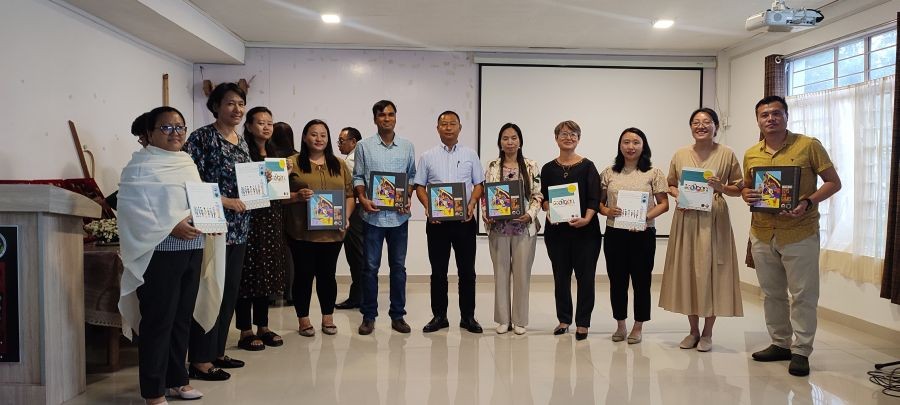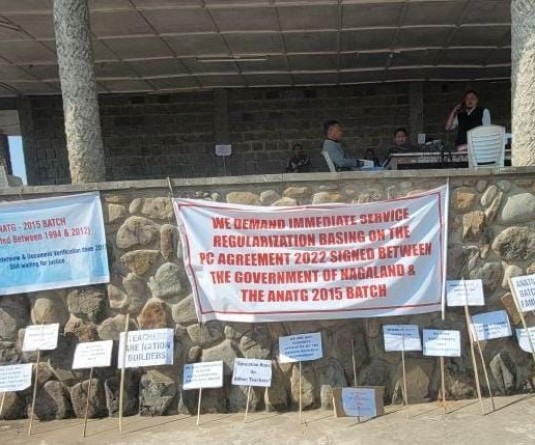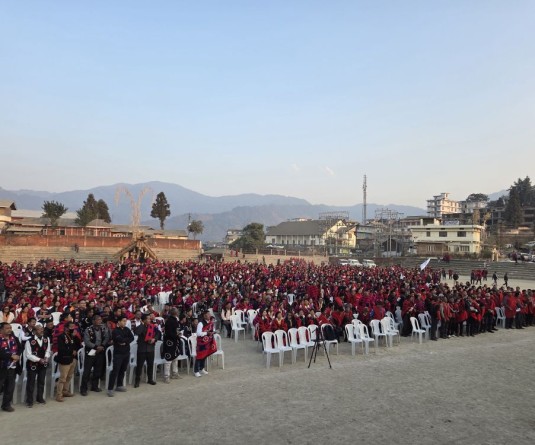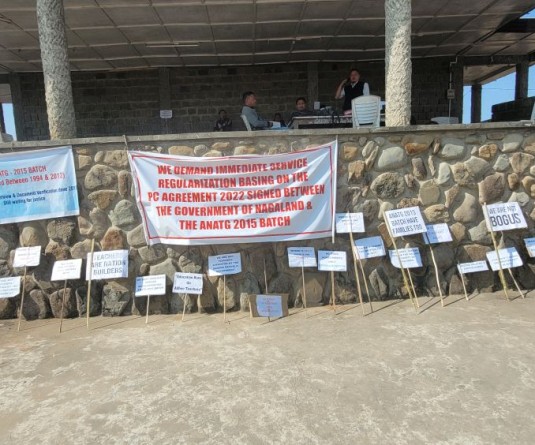Dr Kekhrielhoulie Yhome (M), Bijoy Sankar Das (5th from L) seen with some of the members from ECCE Cell during the launch of the curriculum. (Morung Photo)

Morung Express News
Kohima | June 7
With the mushrooming of preschools in Nagaland with no standardized curriculum, the State Council of Educational Research & Training (SCERT) has observed that the lack of effective curricular framework which is developmentally and culturally appropriate as well as the lack of common curriculum for preschools in Nagaland (Private and Government).
Towards this end, SCERT has endeavoured to provide stimulating and contextualized experiences to children. Further in line with the value that the National Educational Policy (NEP) 2020 has placed on preschool education and the direction it has provided, Early Childhood Care and Education (ECCE) Curriculum was developed by the department.
The curriculum namely, Indigenous Toys and Games of Nagaland; Nagaland ECCE Curriculum Handbook: Theoretical Principles & Thematic framework, Part –A; and Nagaland ECCE Curriculum Handbook: Theme-based Learning Experiences – Teacher Manual Part – B were formally released by Dr Kekhrielhoulie Yhome, Advisor, School Education & SCERT at the SCERT Conference Hall on June 7.
.jpg)
Addressing the launch of the books, he extended his heartiest congratulations to the ECCE Team while terming it as an “innovative hub.” He said that for professional growth, the government has not been able to do enough nor been able to initiate deliberations with other institutions.
However, he expressed pride on the occasion to say that he represents Nagaland while stating that “because we have come out with not just a vision document but with a research policy specifically on Early Childhood Care and Education and this document will go a long way.” He said Nagaland still has a long way to go, but that, there are also so many things to learn from Nagaland.
Nagaland ECCE Curriculum
Sharing his thoughts on Nagaland ECCE Curriculum, Bijoy Sankar Das, Leader- North Eastern States & Jammu & Kashmir, Azim Premji University, Bangalore stated pride and happiness on the completion of the Nagaland ECCE Curriculum while placing on record that all the other states are working on their respective ECCE curriculum referring to the document of Nagaland.
The initiative, he informed started before the NEP while highlighting that SCERT had already started working on it and now, he noted, “all the states of North East are learning from Nagaland. In all states, he said, “when we create a curriculum especially on ECCE, we should create a group out of diverse people including Anganwadi, CDPO, private school systems, etc., and Nagaland did it.”
.jpg)
This, he added, is another learning taken from Nagaland, which is being followed by other states and appreciated the efforts of Nagaland while extending his heartiest congratulations to the team on the publication of the ECCE curriculum.
Director, SCERT, Kevirale- Kerhuo emphasized that “Quality education of young learners is crucial as it serves as the foundation of knowledge and skills, which are building blocks for higher level learning.” Terming the NEP 2020 as a “transformative initiative to attain high quality education for all children reiterating the importance for every child to have access to early childhood care and education”, she said, “this has necessitated the development of curricular and pedagogical framework for ECCE for children upto the age of 8.”
She highlighted that the Nagaland ECCE Curriculum Handbook has been developed to provide good quality preschool education, giving due considerations to the socio-cultural context of the children in the state. Stating that the Nagaland ECCE Curriculum Handbook is crucial for ushering in much needed change in the educational system in the state, she said, “it will also serve as a guiding tool for teachers to develop innovative pedagogical practices and facilitate learning experiences contextual to our children.”
“The handbook is a product of cooperation and collective efforts of subject teachers government and private, teacher-educators from SCERT/DIET, School Education Department, Social Welfare and ECCE practitioners in private sector and faculty from Azim Premji University Bangalore, which is a non-profit organization”, she further highlighted while congratulating the Curriculum Development Team.
“I hope that promoting and ensuring holistic development of children will be sustained through the use of this handbook”, she added.
‘Ongoing Piloting of the Curriculum in 46 Schools of Nagaland’
Giving a presentation on “An overview of the Nagaland ECCE”, Agnes Krocha, Lecturer DIET Chiechama attached to ECCE Cell, highlighted that the ongoing piloting of the Curriculum is in 46 schools of Nagaland. She said that while the pilot process and evaluation is an extensive assessment exercise, it would “help identify the effectiveness of this new curriculum approach and strengthen and improve the course content, materials, and delivery strategies of the curriculum.”
Besides giving a background of the process and development of the Curriculum, she also dwelt on the expected results from the new curriculum wherein teachers become more aware of their role in practicing the principles underlying the fours aspects of the curriculum.
.jpg)
The curriculum is expected to enable a situation where teachers are better able to work with children and have a better understanding of how children engage with the world; create an environment that allows children to be curious and exercise their skills of observation; make classrooms safe spaces for children to imitate life and also alter situations and also focus on providing opportunities for children to engage with the world through a variety of ways such as exploration, inquiry, art, drama, music, movement, storytelling, and games, rather than worrying about a syllabus to finish or textbooks to be filled up besides experiential Learning in classrooms.
It is also hoped that through the curriculum, children develop strong sense of identity, learn to interact in relation to others with care, empathy and respect, become socially responsible and show respect for the environment, become strong in their social and emotional wellbeing, take increasing responsibility for their own health and physical wellbeing, are confident and involved learners, develop dispositions for learning such as curiosity, cooperation, confidence, creativity, commitment, enthusiasm, persistence, imagination, etc.
Agnes Krocha said that the expected results from the Curriculum also include children developing a range of skills and processes such as problem solving, inquiry, experimentation, hypothesising, researching and investigating, and are able to transfer and adapt what they have learned from one context to another and also resource their own learning through connecting with people, place, technologies and natural and processed materials.
The programme was chaired by Vekutulu Veyie, Senior Lecturer, ECCE Cell Head, SCERT Nagaland.





.jpg)
